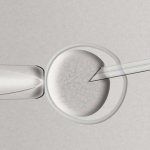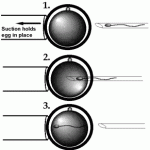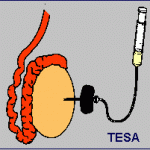Articles tagged with: ICSI
Artificial insemination, ICSI procedure »
The bypass of natural barriers to fertilization, possible genetic defects in men with severe male infertility, and the use of severely abnormal sperm for intracytoplasmic sperm injection has engendered concern over the impact of ICSI on the genetic complement of the offspring . Previous studies have suggested no increase in birth defect rates when IV-F alone was used to induce conception. Van Steirteghem reported no increase in the congenital malformation rate in their center after ICSI when compared with the general population. Of 877 children born after ICSI procedures, 23 …
Artificial insemination, ICSI procedure »
Risks of IVF-ICSI include general risks of IVF as well as the specific risks related to the micromanipulation procedure of ICSI. One of the most significant risks associated with stimulation of the ovaries is the ovarian hyperstimulation syndrome (OHSS). This can manifest as massive ovarian enlargement, peritoneal irritation due to follicular rupture or hemorrhage, ovarian torsion, ascites, pleural effusion, oliguria, electrolyte imbalance, hypercoagulability3l I and sometimes death36 . The syndrome occurs in a moderate form for 3-4% percent of initiated cycles, and in a severe form for 0. 1-0.2 % …
Artificial insemination, ICSI procedure »
One of the largest series reporting results using IVF/ICSI was from Van Steirteghem et al. at The Brussels Free University in Brussels, Belgium. In their preliminary report on 150 couples who underwent 150 consecutive treatment cycles, 1409 oocytes were injected and 830 were successfully fertilized for a fertilization rate of 59 percent. A total clinical pregnancy rate of 35 percent was achieved. The fertilization rate in this study was not influenced by the standard semen characteristics of concentration, motility, and strict criteria morphology. In another largest case serie on ICSI …
Artificial insemination, ICSI procedure »
Until recently, the clinical application of direct injection of a single sperm into the cytoplasm of an oocyte during IVF was not shown to be feasible. The demonstration of fertilization and live births by Palermo et al. in 1993 was the first successful application of ICSI. Since that time, ICSI has been performed extensively in multiple centers to treat patients with severe male factor infertility. To date, the success of ICSI procedures has been related to several factors: (1) the viability of the spermatozoon, (2) the quality of the oocyte, …
Artificial insemination, ICSI procedure »
Intra-cytoplasmic sperm injection (ICSI) is a relatively new but well-established procedure first performed in 1992. The procedure was developed to help male factor infertility. The procedure involves injecting a single sperm into the cytoplasm of each egg using a fine glass needle. The first ICSI baby was reported in 1992. The ICSI has largely replaced the two previously developed procedures, PZD (partial zona dissection) and SUZI (subzonal insemination) because it achieves much higher fertilization rates.
The injection of immature sperm (spermatid) into the egg is not allowed in the UK because …
Artificial insemination, Headline, ICSI procedure »

Intracytoplasmic Sperm Injection (ICSI) is performed as part of an IVF procedure to treat male factor abnormalities. After egg retrieval, using a glass needle, a single sperm is selected by and injected into the egg. This often enhances fertilization to help couples conceive when the man has low sperm concentration, motility, or abnormal shapes. The Follas Center of Reproductive Medicine, our adjacent office-based facility, has state-of-the-art equipment to offer this option to our patients undergoing IVF.
Intracytoplasmic sperm injection, or ICSI, is a form of micro-assisted fertilization where the nucleus (genetic …
Artificial insemination, ICSI procedure »

Any IVF (in vitro fertilization) treatment procedure carries risks. ICSI (intra-cytoplasmic sperm injection), being a very delicate and difficult IVF procedure, does carry an even higher risk of failure. Normally during an IVF treatment programme the males sperm are subjected to rigorous procedures to establish their maturity and suitability for the procedure. In an ICSI procedure, because the number of viable sperm available can be so low they are not subjected to a rigorous programme of testing. The risk of an abnormal sperm being injected into the ovum is, therefore, …
